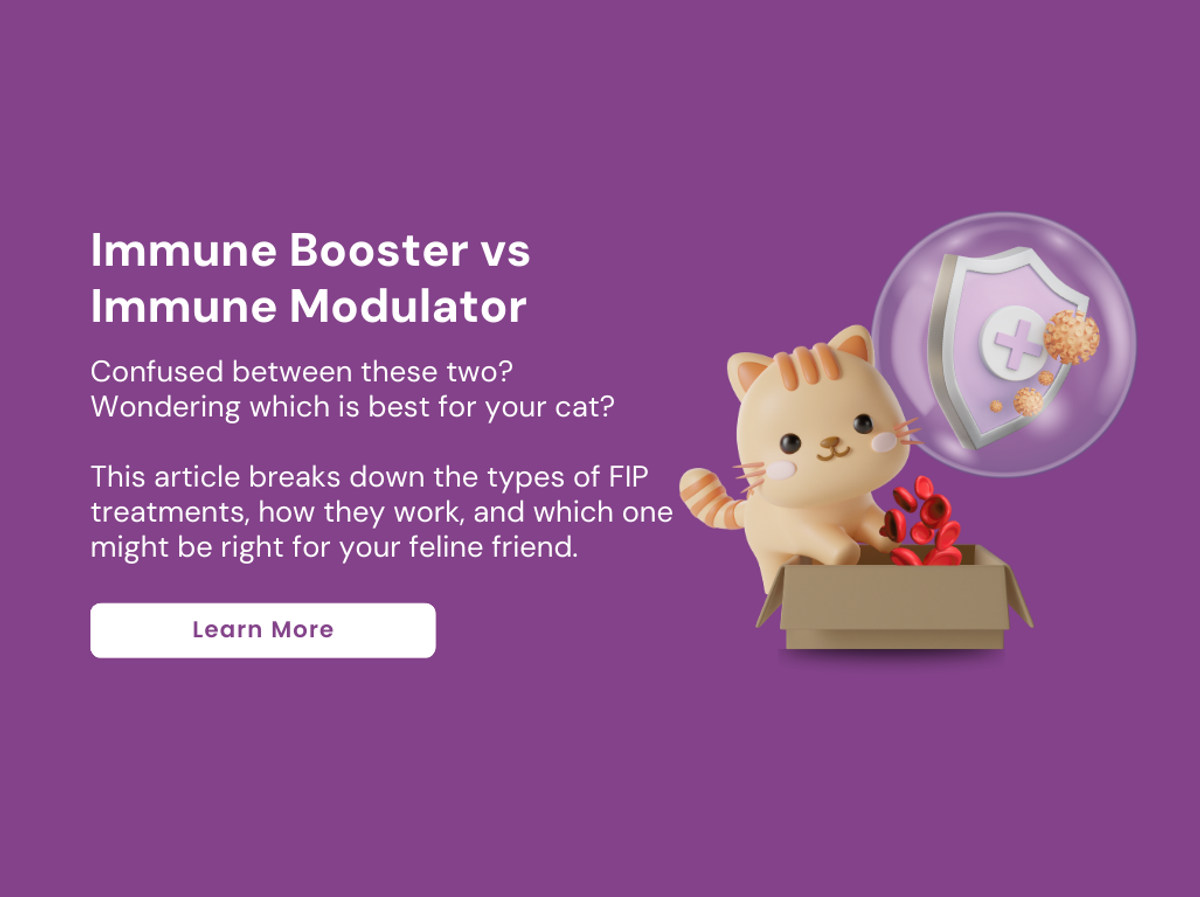
Feline Infectious Peritonitis (FIP) is one of the most devastating diseases affecting cats around the world — including in Malaysia. Once considered fatal, FIP is now treatable thanks to advancements in antiviral therapies such as GS-441524 and supportive care. However, not all supportive supplements are created equal, especially when it comes to the immune system.
A common question among cat parents is:
“Should I give my cat an immune booster or an immune modulator?”
Though they may sound similar, these two types of immune support work very differently — and making the right choice is crucial, especially in FIP cases.
Understanding FIP: An Immune-Mediated Disease
FIP is caused by a mutation of the feline coronavirus (FCoV), which is commonly found in cats and typically harmless. However, in some cats — particularly those with a vulnerable or genetically predisposed immune system — the virus mutates and begins replicating within macrophages, the immune system’s white blood cells.
The result? A hyperactive immune response that leads to systemic inflammation, fluid accumulation, and often, organ damage.
In short, FIP is not just a viral disease — it’s an immune-mediated one.
📖 Source: Pedersen NC. “An update on feline infectious peritonitis: diagnostics and therapeutics.” Vet J. 2014
What Is an Immune Booster?
An immune booster is designed to stimulate the immune system, making it more active or responsive. These are often marketed as general wellness products and may include ingredients such as:
Echinacea
Beta-glucans
Astragalus
Vitamin C or Zinc
When is an immune booster useful?
After mild infections
During general recovery or stress
To support vaccination responses
However, when the immune system is already overactive — as in FIP — further boosting it may actually do more harm than good.
This is like giving an immune booster during FIP is like adding fuel to a fire you’re trying to put out.
What Is an Immune Modulator?
An immune modulator helps to regulate or balance the immune system — not just increase it. This means it can either stimulate or suppress immune activity based on the body’s needs.
Common immune modulators include:
Interferons (e.g., omega interferon)
Polysaccharide peptides (PSP) from medicinal mushrooms
Lactoferrin
Certain peptides or herbal extracts with immunoregulatory properties
In FIP, immune modulators play a crucial role in:
Calming the overreaction of immune cells
Reducing inflammation and cytokine storms
Allowing antiviral drugs like GS-441524 to work more effectively
Also read GS-441524 Basmi FIP, Cara Paling Berkesan Merawat FIP Kucing
Why Immune Modulators Are Better Suited for FIP
Because FIP involves inappropriate immune activation, modulating — not boosting — the immune response is the key to improving clinical outcomes.
Giving an immune booster in such cases can:
Worsen inflammation
Cause more immune-mediated damage
Interfere with the cat’s recovery
Meanwhile, using an immune modulator helps to balance the system, reduce harmful inflammation, and complement antiviral treatment protocols effectively.
📖 Example Study: Legendre AM, Bartges JW. “Effect of polyprenyl immunostimulant on the survival times of three cats with the dry form of FIP.” J Feline Med Surg. 2009.
Comparison Table
Guidelines for Cat Parents in Malaysia
If your cat is undergoing treatment for FIP:
Always consult with a veterinarian experienced in FIP treatment before starting any supplement.
Avoid over-the-counter “immune boosters” unless prescribed — many are not appropriate for immune-mediated diseases.
Look for clinically backed immune modulators that are safe for cats and compatible with FIP medications.
Malaysian FIP caregivers are increasingly informed — and that's a good thing. Brands like BASMiFIP are stepping up to provide science-backed support products and education, tailored specifically for the FIP journey.
Conclusion
The immune system is like a finely tuned orchestra — in FIP, the music is out of control. Boosting the volume doesn’t help, but a good conductor (immune modulator) can bring balance, harmony, and healing.
Before you reach for an “immune booster,” ask yourself: Does my cat need more power — or more balance? In the fight against FIP, the answer is almost always the latter.
For trusted immune support tailored to FIP recovery, talk to our experts!



